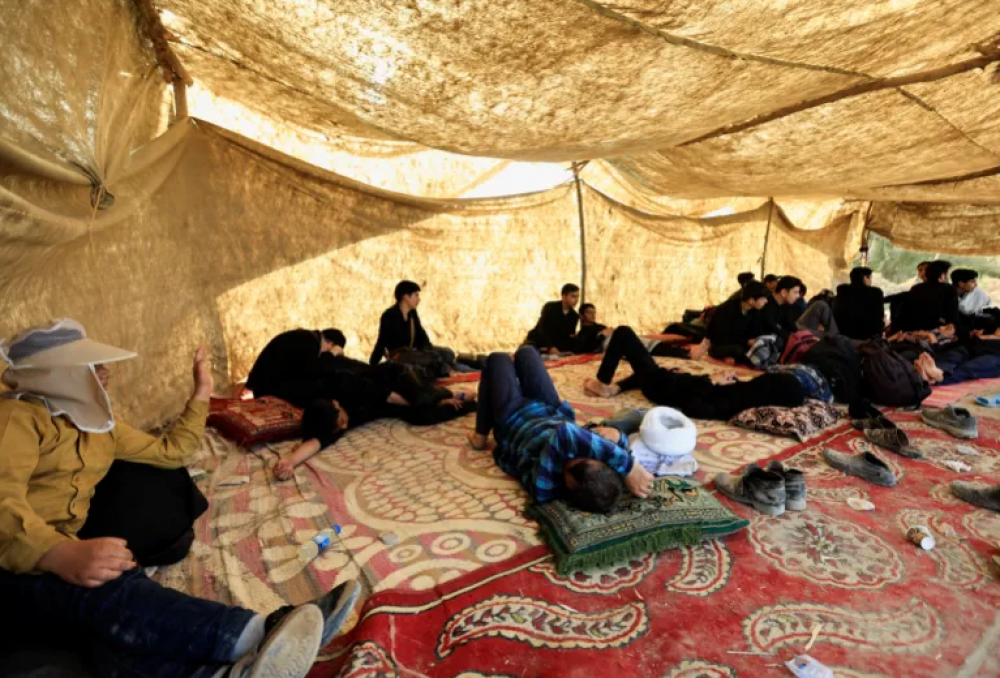Arbaeen pilgrimage brings millions to Iraqi city of Karbala
Shia pilgrims arrive in the holy city of Karbala on Friday to commemorate the martyrdom of Imam Hossein
Irfan Ali Gangjee is a Pakistani citizen living in the United States who has joined millions of Shia Muslims in a journey on foot to the holy city of Karbala in Iraq to participate in Arbaeen, one of the largest annual religious events in the world. Gangjee began his journey in Najaf and walked nearly 80km to reach Karbala. He described the experience as surreal, with oceans of people, including those on crutches and wheelchairs, women, and children. Arbaeen is observed 40 days after Ashura, which commemorates the death of the Prophet Muhammad's grandson, Husayn, in the Battle of Karbala. The event is regarded as one of the foundational moments of Shia Islam and in 2019, more than 14 million people from across the world participated in the pilgrimage. The journey can be physically demanding, with some participants experiencing pain and exhaustion, but many describe feeling spiritually alive.
The journey is especially challenging during the daytime when temperatures range between 36 and 41 degrees Celsius. Together with packed crowds, reports of people fainting due to exhaustion or feeling dehydrated are not uncommon.
To facilitate zaireen (pilgrims), local volunteers, as well as foreigners, setup mawakeb (rest areas), makeshift stalls and clinics all along the roads to provide essentials such as food, water, and beds.
“This one mawakeb I stayed overnight had served some 1,000 people a day. And it's all for free … they don’t ask for anything in return,” Gangjee, a finance professional, said. “It is hard to fathom the scale at which this gathering is taking place.”
‘Searching for inspiration’ In Arbaeen Visitation
Mehdi Hazari, a Shia religious scholar and head of education and research at the Imam Mahdi Association of the Marjaeya (IMAM) in the US, believes that one of the major reasons for the non-obligatory pilgrimage is to search for inspiration in the world for which Imam Husayn died. In today's world, where there is so much noise and we are bombarded with information from all over, we have become complacent and somewhat blind. The pilgrimage is an opportunity for people to awaken their hearts and experience an overwhelming sense of giving, sharing, and brotherly and sisterly love.
Sara Mushtaq, a participant in the pilgrimage, echoes Hazari's sentiments and says that the trip has broken her down physically, mentally, and spiritually, but has given her the chance to rebuild herself. She hopes to take the feeling of love and community from the pilgrimage back home with her and incorporate it into her daily life. She wants to teach her children what it means to be a lover of Hossein and carry on the spirit of the pilgrimage in her daily interactions with others.
Pandemic, political instability in Iraq
This year's Arbaeen pilgrimage is the first time since the start of the COVID-19 pandemic in March 2020 that there are no restrictions or caps on foreign travelers. However, there has been political instability and violence in Baghdad due to tensions between Shia political forces, with more than 30 people dead in August. As a result, some countries have urged their citizens not to travel to Iraq. Despite these challenges, Irfan Ali Gangjee was determined to participate in the pilgrimage and felt a calling to do so. He made the decision to go during the first 10 days of Muharram and booked his trip immediately. He never considered canceling his flight and would only have been prevented from going if he was not allowed into Iraq.
